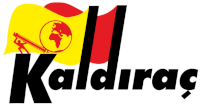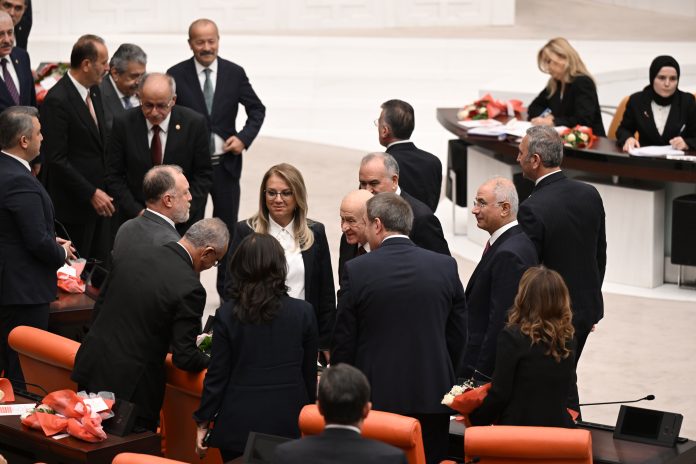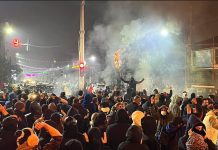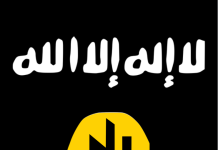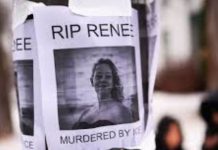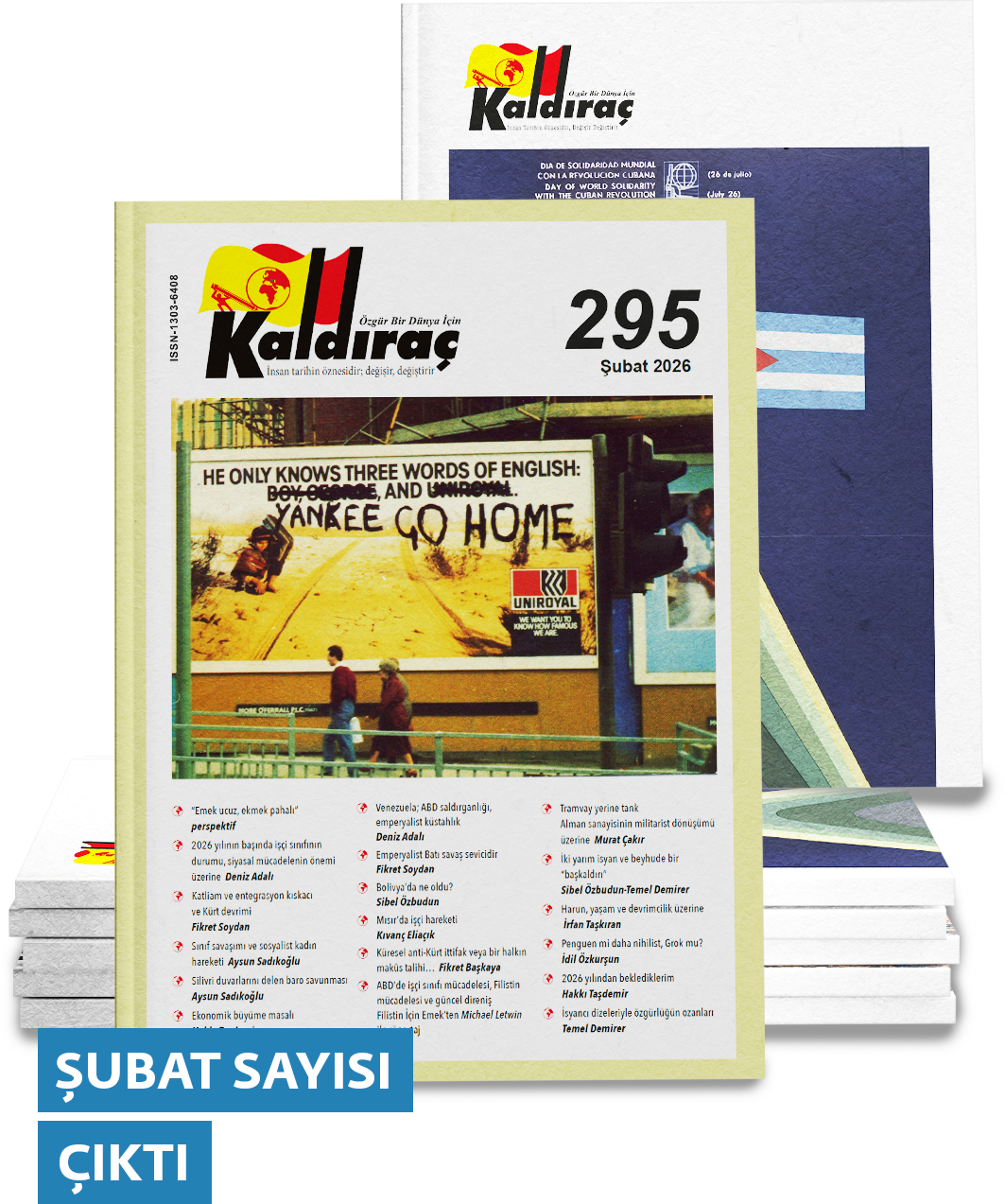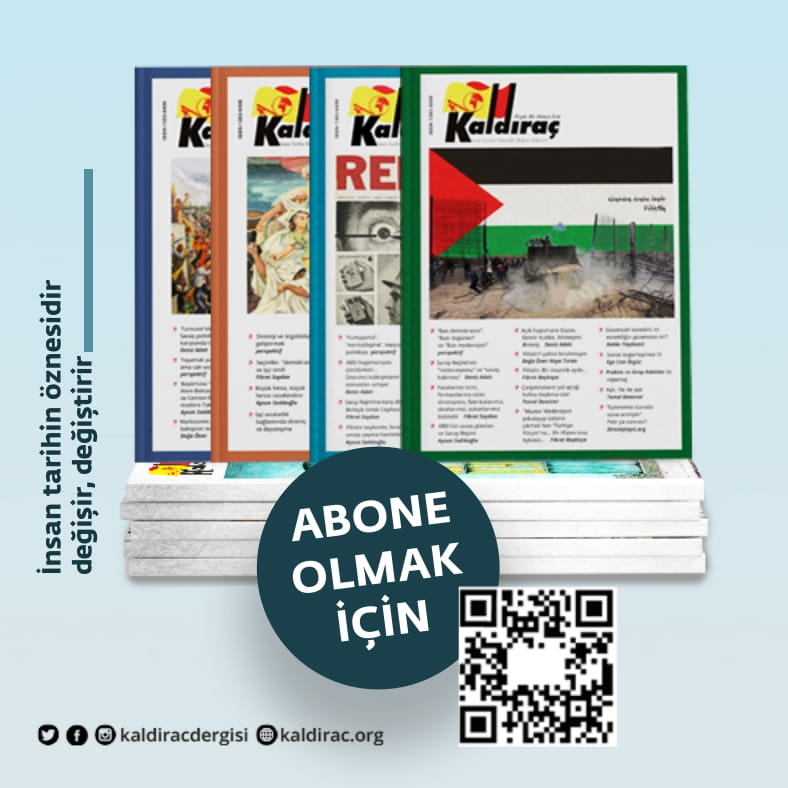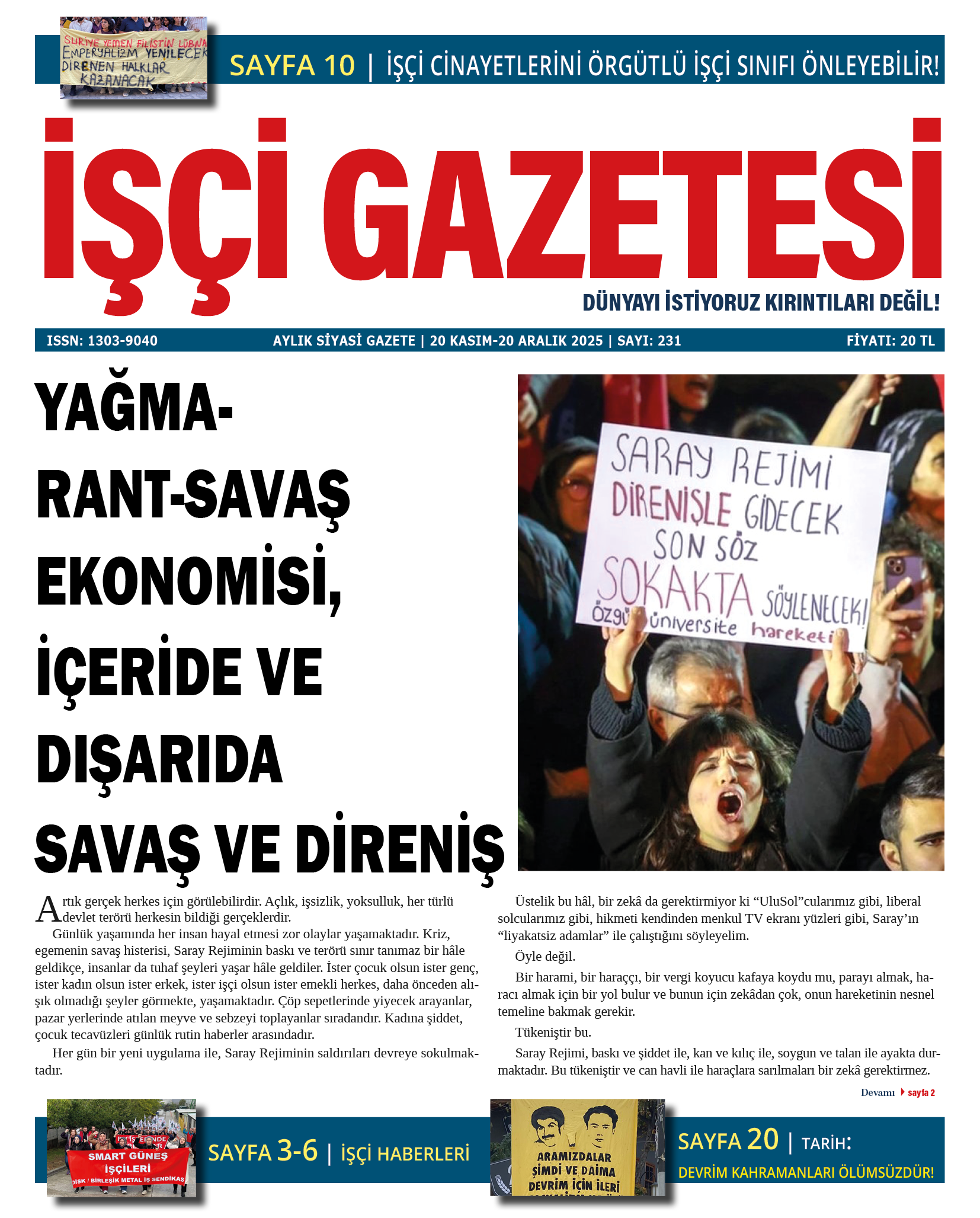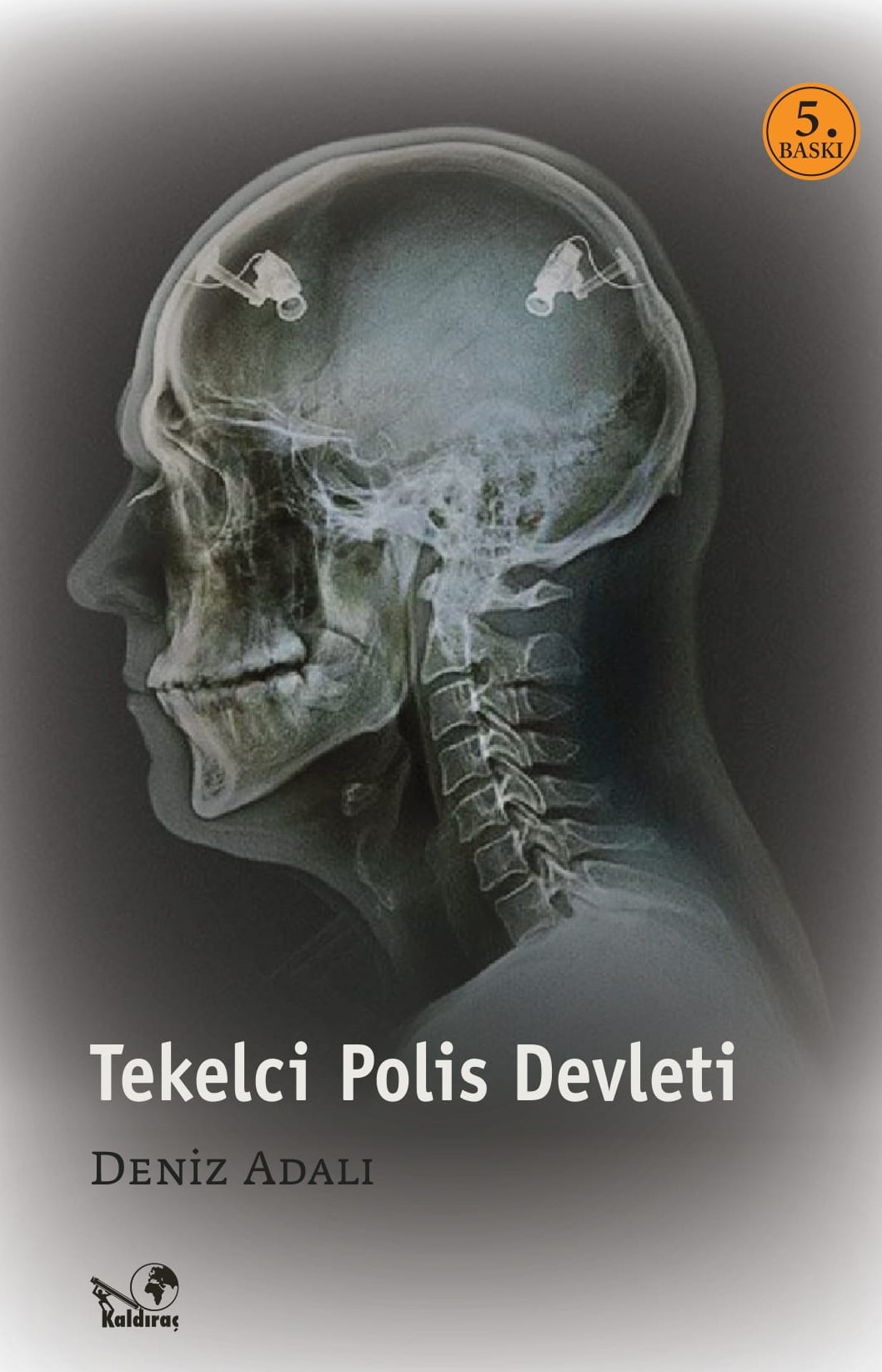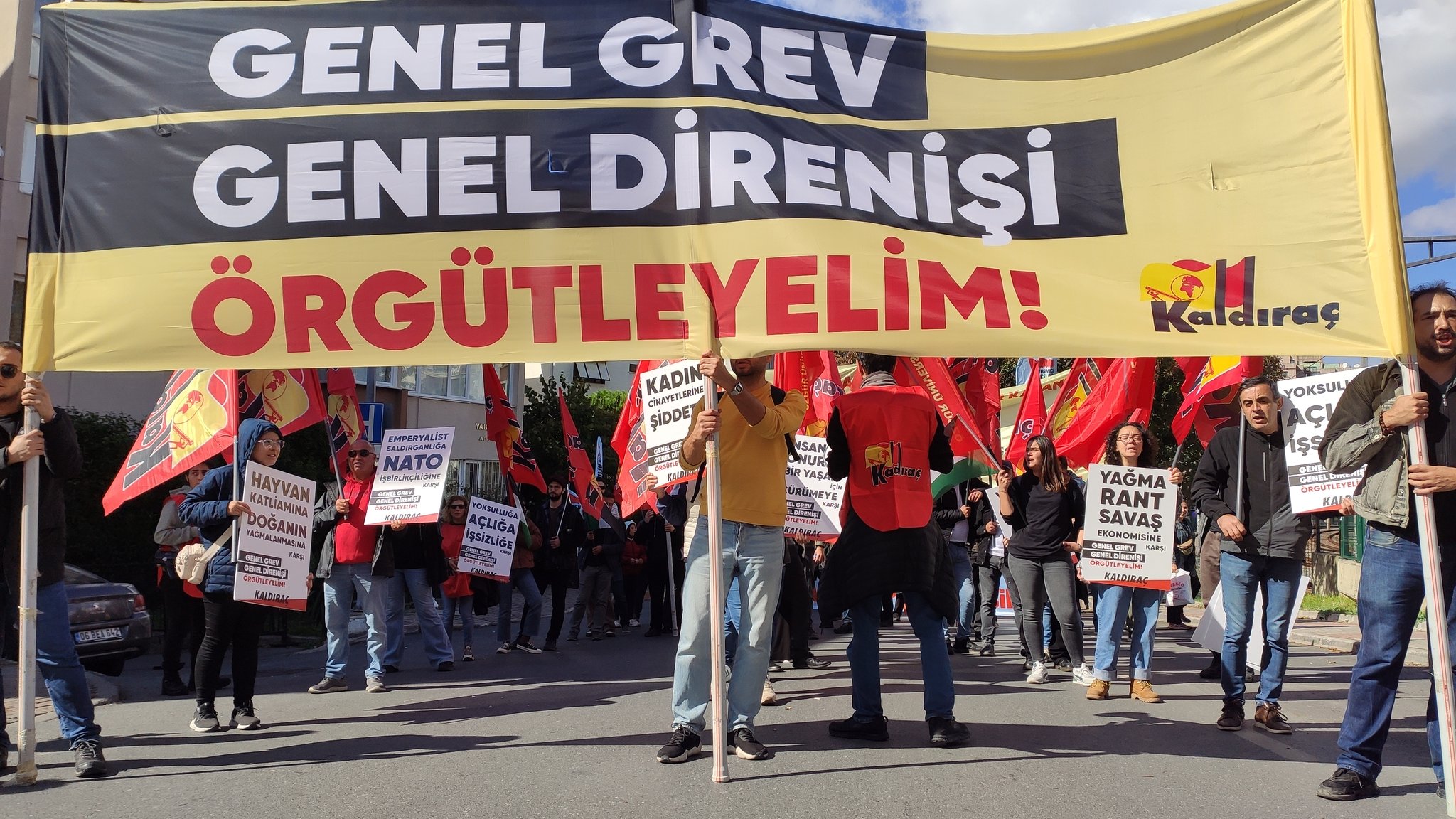Deniz Adalı
February 2025 – Kaldıraç Issue 283
The Palace Regime, which the Kurdish movement calls “AKP and MHP Fascism”, made a move through the hands of the MHP (Nationalist Movement Party). Bahçeli suddenly got up from his parliamentary seat and shook the hands of the DEM Party officials in a manner unbecoming of him. The matter of Turkey’s “survival” was on his agenda and has been for a long time. We have seen him advocate massacres of Kurds to solve this “survival” problem. However, this scene of shaking hands in the parliament is an unusual move.
That means, the order is coming from a great place. The source is not unknown; it is NATO. NATO, of course, means the US imperialism in the first place and Western imperialism in general. It is their war machine.
Bahçeli has advanced this step.
Meanwhile, the palace continued its trustee attacks. Elected mayors were removed from their offices, as is customary, and the municipalities were handed over to trustees. Trustee stands for the Palace. But Bahçeli, as ordered, started his statements and suggested that Öcalan should speak in the DEM parliamentary group in the Grand National Assembly of Turkey and call for the disbandment of the PKK in exchange for the “right to hope”. He suggested this openly. He did not speak behind closed doors.
So, Bahçeli’s speeches are in fact a requirement of the negotiations that seem to be going on behind the scenes and are obviously aimed at reassuring Öcalan. If a fascist party like the MHP, a party that has turned Kurdish hatred into a kind of internal existence, made these statements, it might have been understood that the Palace Regime was sincere on the issue. After all, it was Erdoğan who had previously overturned the table. Dolmabahçe is well remembered. The process of overturning that table became a new attack process and the Palace Regime was organized. In other words, if the new move against the Kurds is made not by Erdoğan, but directly by Bahçeli, it might have some credibility.
The extraordinary organization of the Turkish state, the monopolist police state, which we call the Palace Regime, actually includes all bourgeois parties. But there is a view, an image, as if the MHP and the AK Party are together in the ruling party and the others are in opposition. For this reason, many people call this Palace Regime “AKP-MHP fascism”. Here, the MHP, one of the grounds for this word “fascism”, is making an “opening”.
It would be wrong to assume that one day the MHP suddenly came to its senses and embarked on a process of great change. The MHP is the same old MHP and it is clear that it is not a political party, it is a gang. Just as the AK Party is not a political party, the MHP is not either. Each and every one of them has become and is becoming redundant. Parliament is not a parliament either. Its appearance seems to be more important for the sovereign. It is pretended to exist as a parliament.
But for the MHP to talk about this issue with words like “peace” is, of course, more serious because of the MHP’s racist policies. Erdoğan always says one thing and the next day the opposite.
If anything, the MHP’s outburst is (a) a preparation indicating that the direction of developments in Syria is known or predicted in advance and (b) an attempt to reassure Öcalan as part of long-term preparations at home.
We are not talking about whether, for example, the MHP or the Palace knew in advance that Assad would fall in Syria. The role they wanted to play there was already clear. But when we say “knowing the direction of developments in Syria”, we mean that the Kurdish movement, the PYD branch, has made or will make progress there. This is not difficult to know, it is apparent, it is clear. In this case, it means that the Kurds, who have established a rapprochement with the USA in Syria, together with those on the Barzani line, are seeking to establish a rapprochement with Turkey.
If so, we can say that negotiations on this issue have been going on for a longer period of time. Or it is very likely.
Now, we know that there is both an internal and an external aspect.
It is clear that the Kurds have achieved some gains in Syria. This gain should be mentioned cautiously. Because the new administration of Syria is composed of HTS. HTS is directly linked to the USA, England and Israel. And because of these ties, it is not possible to say that the war in Syria is over. Because for the USA, England and Israel, the victory in Syria (in reality, it is a victory for these three and only for these three) is a step in terms of their regional policies and in this respect it marks a new phase of the war. Of course we welcome the Kurdish gains. We consider their every gain to be our gain as well. But it is clear that we need to be cautious in this regard. HTS is not a more positive counterpart than Assad.
Already, after HTS seized Damascus and was immediately recognized as a government by the West, there has been pressure on the Kurds to leave Manbij and Kobanȇ. For the US, it is important that the Kurds step in to protect the oil field under its control and cooperate in the attack against Iran. Otherwise, Manbij and Kobanȇ are not important for the USA.
Besides, the same USA is eager to drag the Turkish and Kurdish forces that will act on its side into the war against Iran, and this is known.
On top of that, in the Syrian arena, the Kurds have to talk to an alternative that is worse than Assad, not because it is better. HTS is also a gang, an Islamist extension of the USA, and comes from within ISIS, whose massacres were resisted yesterday under the leadership of the PYD at great cost. For example, when talking to HTS, even a secular emphasis is not possible.
There is another factor. Yesterday, when Russia and Iran were on the stage, the USA would have been more favorable to the Kurdish demands. Because, after all, there would be rival powers on the ground and there would be a possibility of losing the Kurds. Yet today, such a situation is largely absent.
Despite all this, of course we do not have such a problem as ignoring the gains of the Kurds. While we list the possible moves of the rulers, we do not claim that the Kurds do not see them. We see every achievement of the Kurds as our achievement.
But we know three recent events. The first is the USA’s demand for the PYD to hand over Manbij to the FSA which is under the supervision of the Turkish Republic. This was announced by Mazlum Kobani. And finally the PYD withdrew from Manbij.
Secondly, in response to the Turkish attacks in Kobanȇ, a US-supervised disarmament was also proposed. These are indicators that there are no guarantees for gains, whether tactical or not, and that it is necessary to speak cautiously on this issue. This cautiousness is also present among Kurdish revolutionaries.
The third is the alleged meeting between Mazlum Kobani and Barzani. Of course the two Kurdish movements do meet and they don’t have to ask anyone about it. But we know beyond any doubt that Barzani is an extension of the USA. And he is the symbol of the reactionary and backward wing of the Kurdish movement.
All this is very important under circumstances where it is known that the USA is planning an attack against Iran using Israel, the Turkish state and the Kurdish movement.
At the same time, the Turkish state is launching heavy attacks against the Kurds. And in fact, this threat is met with “ sympathy” by the USA. The Turkish Republic is raining bombs on Kurdish populated areas in Syria and the USA expresses that Turkey’s security concerns are justified. When Russia was on the ground, they would not have made such statements.
This means that in the Syrian arena, the prevailing approach is that either you do as I say or face massacre at the hands of the Turkish state.
In our opinion, the same game is being played inside.
Let us not be misunderstood, we are not criticizing the Kurdish movement for engaging in these talks. Of course, this is their own business. And unlike many leftists and nationaleftists, we do not have concerns about the Kurdish movement constantly making secret agreements with the AK Party.
The Kurdish movement has enough experience in this regard and we have confidence in it.
But the unnamed policy put forward by the MHP and the Palace Regime is, in reality, a war trick, a war game, put into action to lower the Kurdish movement’s guard, break its defense and weaken its resistance. This is why it can be called a “peace” play. Both dear Sırrı Süreyya, when he says “peace has no loser”, and the leader of the MHP talk about peace. Therefore, it seems more appropriate to call it the search for peace. For the sovereign, however, this is a trick of war.
In this search for peace, the Turkish state, the Palace Regime, is also increasing its attacks. On the one hand, Öcalan is asked to say “PKK has been disbanded” in the second meeting, on the other hand, it is said “either you bury your weapons or we will bury you”. Although this may seem contradictory, it is not contradictory as a language. It is not, because it is exactly in line with the character of the Turkish state. In the midst of all these debates, the Palace Regime, for example, has introduced trustee policies and is increasing the intensity.
We know that the Palace Regime, the Turkish state, whenever it extends its hand, it always puts a massacre policy into action.
It would not be an exaggeration to think that just as the US-Israel has carried out attacks and assassinations against the leaders of Hezbollah, similar practices will be employed against the Kurdish movement. Therefore, it is probably not unreasonable to think that as the PKK is pushed, they want to invest in the possibility for their leaders to act more uncontrollably. “Either you surrender with your weapons or we will bury you with them” includes these special operations on the one hand and aerial and ground bombardments on the other. The Turkish state is experienced in these massacre policies, it has a accumulated background.
It appears that the Turkish state is acting as a triggerman in full compliance with the plans of the USA. Therefore, it has a dual attitude towards the Kurdish movement. This is clear. Either there will be cooperation with the Turkish Republic on a line like that of Barzani and play a role on behalf of the US in the region, or the Kurdish movement will be threatened with suffocation. This is what they are doing. If so, today the rulers want to bring forward the reconciliatory tendency, one of the two tendencies that exist within the Kurdish movement. This cannot be done through the name of Barzani. They want the Kurdish movement to experience a decisive split. For this, they want the Barzani line to come to life under other names. In other words, instead of first investing in the ideological overthrow of the revolutionary line, they want the Barzani line to grow in a different version in practice. They want to do all this through the relations established between the USA and the Kurds in the Syrian arena. And in this respect, it is understood that they want to put the PKK in a deadlock.
The genocidal policy against the Palestinian people is known. Of course, the Kurds are much more organized than the Palestinians and their organization is not based on a religious reference point such as an Islamic basis. This is a great advantage. Its value must be recognized. But what is being imposed on the Kurds, in one part or another, in Syria, in Turkey, etc., is this policy of massacre. The attempt to put HTS in a “sovereign” position in Syria is precisely a move in this respect.
It is very difficult for Mazlum Kobani to pull Barzani to a more positive line. Barzani’s stance during the ISIS attacks is well known. But Barzani’s influence exists in every part, even if it shows different characteristics, even if it shows different tones. Just as the revolutionary line exists in every part.
When we turn to the Turkish arena, the peace game of the Turkish state appears in reality as a preparation for new massacres and new attacks.
The path the Turkish state has taken is clear: To take part in a comprehensive war against Iran, led by the USA, England and Israel. Make no mistake, we cannot sympathize with the regime in Iran. But the purpose of such a war is clear. Just as opposing the US occupation policy against Iraq does not mean siding with Saddam, opposing the war against Iran is the same. This is a war of division. The Iran war is a more comprehensive version of the new US administration’s policies on Canada, Panama, the Gulf of Mexico and Greenland. It also means the bloodshed of the entire region.
A question arises here. So what should be done? Of course, this question is a common question and problem for all revolutionary groups in our region. No revolutionary can present supporting the rulers in their own country as a legitimate policy. This policy is known. The attitude of the Kautskys in the First World War is well remembered.
If so, the way is clear. It is necessary to build a revolutionary resistance around the revolutionary course of the working class in the whole region. This is of course the struggle for revolution and socialism. This should be the fundamental approach of revolutionaries both in Iran, Turkey and Egypt. In our region, it is not possible to fight against imperialism in a consistent manner with an approach based on any religious, sectarian or national identity. Of course, there are those who do this, those who are sincere about it. But as seen in the example of Hamas, this kind of struggle is incapable of yielding results. It is also not possible to wage a determined and consistent struggle against imperialism without opposing capitalism at its roots, without objecting to capitalist relations at its roots. Imperialism exists in our region, both de facto and through its states in the region. A decisive struggle against all of these can only be waged through the revolutionary line of the working class.
What we have to do is not limited to criticizing the various moves and maneuvers of the Kurds. They know what to do better than us. They have years of accumulation and experience. They have organizational structures. What we need to do is to organize mass resistance along the lines of the revolutionary workers’ movement. Achieving this is a contribution to every resistance in the region. Just as every revolutionary resistance in the region paves and will pave the way for our struggle, similarly, as our struggle develops, it will have similar effects. So we have to focus more on our own shortcomings. We live in one of the countries in the region that objectively has a developed working class. Along with Egypt and Iran, the working class in Turkey is a well developed working class. This is a potential. In all three, there are serious deficiencies in the unification of revolutionary organization with the working class. Our task is to solve this problem.
